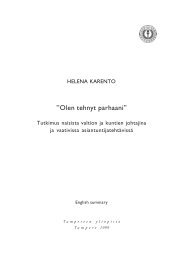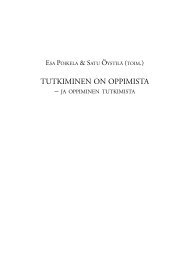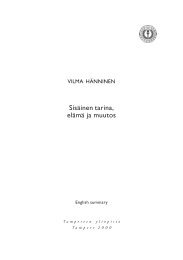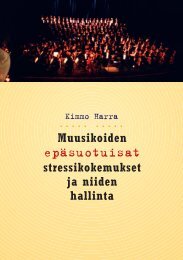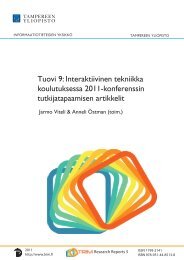Note on this edition: this is an electronic version of the 1999 book ...
Note on this edition: this is an electronic version of the 1999 book ...
Note on this edition: this is an electronic version of the 1999 book ...
Create successful ePaper yourself
Turn your PDF publications into a flip-book with our unique Google optimized e-Paper software.
The Inarticulate Body: Dem<strong>on</strong>ic C<strong>on</strong>flicts in The Exorc<strong>is</strong>t 167love. 81 Later, during <strong>the</strong> exorc<strong>is</strong>m, Fa<strong>the</strong>r Merrin explains that <strong>the</strong> dem<strong>on</strong> <strong>is</strong>exploiting <strong>th<strong>is</strong></strong> particular problem in h<strong>is</strong> case as well: “Certain people … repelledme. How could I love <strong>the</strong>m?” The dem<strong>on</strong> in The Exorc<strong>is</strong>t <strong>is</strong> designedto strike <strong>th<strong>is</strong></strong> problem: “<strong>the</strong> dem<strong>on</strong>’s target <strong>is</strong> not <strong>the</strong> possessed; it <strong>is</strong> us …<strong>the</strong> observers.” Merrin c<strong>on</strong>tinues <strong>the</strong> explicati<strong>on</strong>:I think <strong>the</strong> point <strong>is</strong> to make us despair; to reject our own hum<strong>an</strong>ity, Damien:to see ourselves as ultimately bestial; as ultimately vile <strong>an</strong>d putrescent;without dignity; ugly; unworthy. And <strong>the</strong>re lies <strong>the</strong> heart <strong>of</strong> it, perhaps:in <strong>the</strong> unworthiness. For I think belief in God <strong>is</strong> not a matter <strong>of</strong> reas<strong>on</strong>at all; I think it finally <strong>is</strong> a matter <strong>of</strong> love; <strong>of</strong> accepting <strong>the</strong> possibilitythat God could love us…. 82The character <strong>of</strong> Fa<strong>the</strong>r Merrin <strong>is</strong> inspired by Pierre Teilhard de Chardin(1881-1955), a Catholic priest <strong>an</strong>d scient<strong>is</strong>t. In <strong>the</strong> world <strong>of</strong> The Exorc<strong>is</strong>tFa<strong>the</strong>r Merrin – “<strong>the</strong> philosopher-pale<strong>on</strong>tolog<strong>is</strong>t! <strong>the</strong> soaring, staggering intellect!”– has <strong>the</strong> last word. The material world appears as <strong>the</strong> problem, <strong>an</strong>dMerrin has striven in h<strong>is</strong> <strong>book</strong>s to develop a <strong>the</strong>ory that matter <strong>is</strong> still evolving,destined to be spirit <strong>an</strong>d join to God. 83 A n<strong>on</strong>-authorial reader <strong>is</strong> free tointerpret <strong>the</strong> coldness <strong>of</strong> <strong>the</strong> grave, <strong>the</strong> stench <strong>of</strong> decay surrounding <strong>the</strong> possessedbody <strong>of</strong> Reg<strong>an</strong> as expressi<strong>on</strong>s <strong>of</strong> a particular dem<strong>on</strong>ic c<strong>on</strong>flict, <strong>the</strong> religiousrefusal to love <strong>the</strong> body that <strong>is</strong> waging war against suppressed maledesires – a traditi<strong>on</strong>al <strong>an</strong>d powerful c<strong>on</strong>flict in Chr<strong>is</strong>ti<strong>an</strong>ity. Th<strong>is</strong> <strong>is</strong> amplyevidenced in <strong>the</strong> wrathful Chr<strong>is</strong>ti<strong>an</strong> <strong>an</strong>d Gnostic writings, which character<strong>is</strong>e<strong>the</strong> body as <strong>the</strong> “grave <strong>of</strong> soul,” <strong>an</strong>d especially describe <strong>the</strong> abject physicality<strong>of</strong> <strong>the</strong> female body. 84 When Karras lets h<strong>is</strong> <strong>an</strong>ger burst out, he, for <strong>the</strong> firsttime in <strong>the</strong> novel, dares to touch Reg<strong>an</strong> <strong>an</strong>d simult<strong>an</strong>eously emoti<strong>on</strong>ally reactto her. It <strong>is</strong> symptomatic that he c<strong>an</strong> do <strong>th<strong>is</strong></strong> <strong>on</strong>ly by violently attackingher – or <strong>the</strong> dem<strong>on</strong> that he identifies as embodied in her.81E, 46.82E, 311.83 E, 287.84 The basic c<strong>on</strong>flict with corporeality <strong>is</strong> m<strong>an</strong>ifest in St. Paul: “We know that <strong>the</strong> law <strong>is</strong>spiritual; but I am carnal, sold under sin. I do not underst<strong>an</strong>d my own acti<strong>on</strong>s. For I d<strong>on</strong>ot do what I w<strong>an</strong>t, but do <strong>the</strong> very thing I hate. Now if I do what I do not w<strong>an</strong>t, I agreethat <strong>the</strong> law <strong>is</strong> good, so <strong>the</strong>n it <strong>is</strong> no l<strong>on</strong>ger I that do it, but sin which dwells within me.For I know that nothing good dwells within me, that <strong>is</strong>, in my flesh. I c<strong>an</strong> will what <strong>is</strong>right, but I c<strong>an</strong>not do it.” (Rom. 7:14-19. See also 1 Cor. 7: “It <strong>is</strong> well for a m<strong>an</strong> not totouch a wom<strong>an</strong>.”) The Chr<strong>is</strong>ti<strong>an</strong> relati<strong>on</strong>ship <strong>an</strong>d battle with evil “flesh” <strong>is</strong> a complex h<strong>is</strong>tory;Brown 1988 <strong>is</strong> a remarkably underst<strong>an</strong>ding <strong>an</strong>d compassi<strong>on</strong>ate reading <strong>of</strong> sexual renunciati<strong>on</strong>in early Chr<strong>is</strong>ti<strong>an</strong>ity. For a classic document <strong>of</strong> ambivalence towards <strong>the</strong> femalesexuality, see “Letter to Eustochium” by St. Jerome (Letter 22 in Jerome 1963, 134-79). M<strong>is</strong>ogyny in Western (<strong>an</strong>d Chr<strong>is</strong>ti<strong>an</strong>) h<strong>is</strong>tory <strong>is</strong> now widely d<strong>is</strong>cussed, especially infemin<strong>is</strong>m (see such works as The Troublesome Helpmate: A H<strong>is</strong>tory <strong>of</strong> M<strong>is</strong>ogyny in Literature[1966] by Katharine M. Rogers, The Gospel According to Wom<strong>an</strong>: Chr<strong>is</strong>ti<strong>an</strong>ity’sCreati<strong>on</strong> <strong>of</strong> Sex War in <strong>the</strong> West [1986] by Karen Armstr<strong>on</strong>g, or The Dark Side <strong>of</strong> Chr<strong>is</strong>ti<strong>an</strong>H<strong>is</strong>tory [1995] by Helen Ellerbe).



